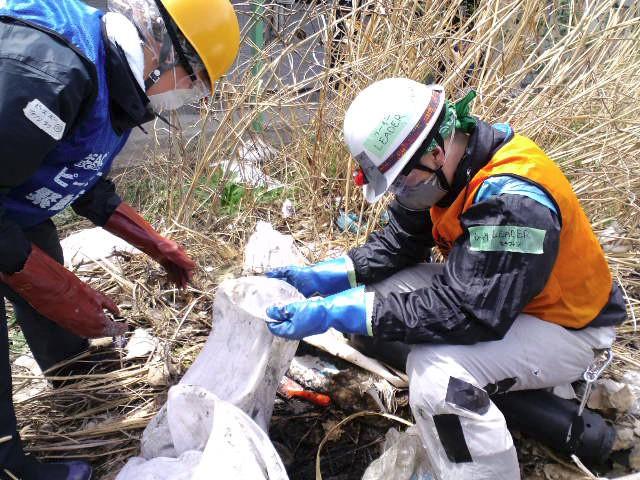Alum works to rebuild Japan

Courtesy photo / Emma Pierce
Jun 9, 2011
When Grand Valley State University alumnus Emma Pierce first stepped foot in Japan’s disaster area, she said it was a bit surreal.
“There was evidence of devastation everywhere, yet many people seemed to be going on with their daily lives, walking down the street, cleaning up their shops,” Pierce said. “I didn’t really allow myself to react to it at the time; I just worked.”
Pierce took part in a mission aboard Peaceboat, a non-governmental organization that is helping to clean up the remains of Japanese communities after a deadly tsunami decimated the area in March. Within hours, the disaster claimed over 700 lives while over 600 people went missing and over 1,400 people were injured. The earthquakes that followed the tsunami added to the damage, leveling most of the affected area.
With little to give, local people thanked the volunteers, like Pierce, by giving gifts.
“The people were strong and extremely grateful for anything,” she said. “A woman in Ibarazu served us water and gave us candy and snacks during a mid-morning break. Another man, whose house was near our campsite, wandered over and gave us lettuce from his garden. It was hard to accept gifts from people who had lost so much, but they were so happy to have volunteers, and it seemed they would have been crushed if we refused.”
Pierce said she moved to Japan after college to both broaden her cultural horizons and to further her career. She said that it was exciting to experience the culture that is so fundamentally different from that of the western world. She took part in the Japanese Exchange and Teaching (JET) program, teaching English as a second language in Japan.
“The JET program was perfect because my career interests are teaching and second-language linguistics,” she said. “I took a Japanese language course in college, and really enjoyed it. Also, my husband’s family is part Japanese, so I was able to get some exposure to the culture before moving to Japan.”
Pierce remembers the earthquake that occurred that day and the shock that accompanied it.
“When the tsunami hit, I didn’t really know the extent of it or how to react,” she said. “I had just returned to my school’s staff room after evacuating the building with all the students because of the earthquake. The quake had felt different from ones in the past, but I wasn’t prepared for what I would see on TV. Even after seeing images of the tsunami flooding areas of Sendai, the degree of damage and death wasn’t clear until nearly a week later.”
While she wanted to help immediately, the confusion and shock caused by the tsunami made helping difficult. Pierce did what she could do from home by donating money and giving blood to aid those who were injured. Her husband Daniel found information about Peaceboat, and they decided that they would both participate in the clean-up.
“I did a lot of clean-up,” Pierce said. “I shoveled mud, moved rubble and sludge bags, scrubbed floors, and power-washed many things. On one special mission in Ibarazu, I had to pick up month-old, maggot filled, fish and squid remains. The neighborhood had a huge fish cannery, but it was busted open and destroyed by the tsunami. They called on us to help relieve the smell, which they had been dealing with for several weeks.”
Although their lives were rocked by the disaster, Pierce said that the locals seemed to be coping well, but she notes the cultural differences in the wake of a catastrophe.
“It was hard to tell how people were really coping with the situation,” she said. “A big part of the culture here is to ganbaru, or do your best.”
Pierce said she would love to go back and continue to help in the restoration effort, but will have to wait until summer to do so. She and her husband are in contact with several volunteer organizations and are looking forward to being able to lend a helping hand to those in need.
“There are a lot of things that can be done to help,” she said. “Utilize creative talents and raise funds. There was a huge response with donations at first, which is great, but now that the locals are getting into the gritty clean-up, they will need tools, machines, leaders, and more volunteers. Displaced people will also need temporary housing.”
She added that although hands on relief is important, there is still a lot that those grounded in the U.S. can do to help.
“Any money raised can help with these costs, and fundraisers are a great way to go about it,” she said. “Hold concerts, dinners, parties, art shows, workshops, anything. Most importantly, keep the word out. The news is quick to move on, but the people in Tohoku are still asking for help.”
To follow the relief efforts of the Peaceboat and volunteers like Pierce, or to learn more about getting involved, visit www.peaceboat.org.

























